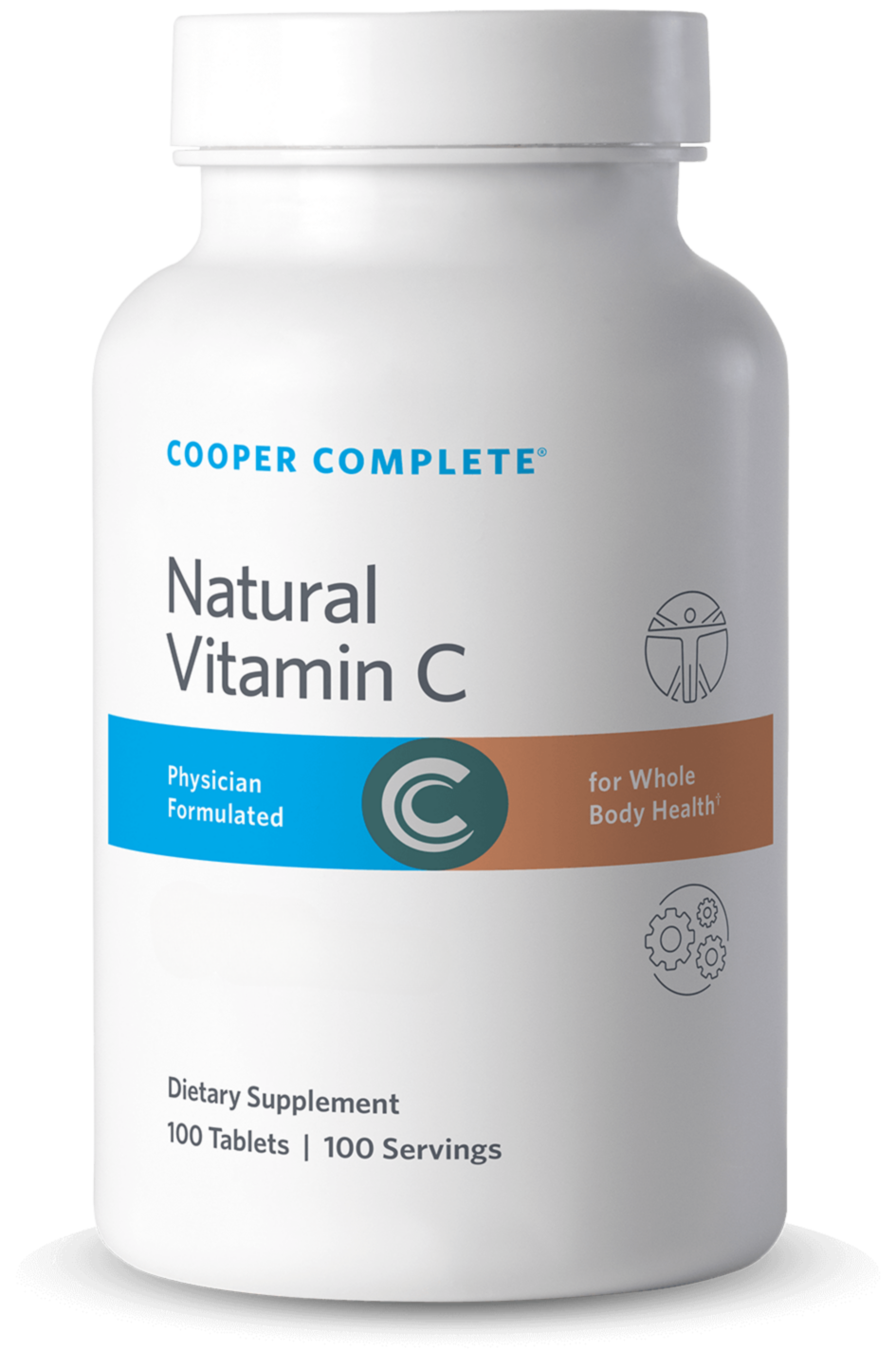Health Benefits of Vitamin C Supplements

Many people reach for vitamin C supplements at the first signs of a cold. Overall, research has yet to show any significant results in taking vitamin C after the onset of cold symptoms. However, daily vitamin C intake has been shown to reduce the frequency and severity of colds and other minor respiratory infections.
Since COVID-19, the importance of supplementation for immune health has increasingly gained attention. Studies continue to show the benefits of vitamin D, zinc, and vitamin C.
While the body does not naturally produce vitamin C, it serves an essential role in protecting cells against free radicals, which supports a healthy immune system. This vital nutrient also improves iron absorption, helps lower LDL cholesterol, and decreases the risk of heart disease.
Vitamin C and Immune Health
While vitamin C cannot prevent you from getting sick altogether, it is an essential nutrient that strengthens your body’s natural defenses and may help reduce the severity of sicknesses, such as the common cold and the flu.

Natural Vitamin C Supplement
Natural Vitamin C Supplement contains 850 mg of vitamin C (as calcium and magnesium ascorbates), plus citrus bioflavonoids to support cells, immune health, and healing.†
$29.98 Add to cartResearchers compared 29 clinical trials involving over 11,000 participants. They examined the effects of taking daily vitamin C. These trials look at the prevention and treatment of colds related to different levels of vitamin C consumed.
Research on Vitamin C for Cold Prevention
On the surface, the vitamin C benefits for cold prevention don’t seem to exist. Compared to common advice, taking vitamin C daily did not reduce the development of a cold.
However, a subset of the studies looked at people living in extreme circumstances, including skiers, marathon runners, and soldiers on subarctic exercises. According to the study conclusions, “evidence shows that it could be justified in persons exposed to brief periods of severe physical exercise and/or cold environments.” Further, they found a “50% reduction in common cold incidence.”
As the subset of athletes was small, more studies are needed. Regardless, it looks like vitamin C for cold prevention in this population may make great sense.
This falls in line with results Dr. Cooper found in his research on marathoners. He examined people exercising at 80 percent of the predicted maximum heart rate for a minimum of five hours per week and found they have unique vitamin needs.
Cooper Complete® Natural Vitamin C with bioflavonoids supports a healthy immune system. Serving as a powerful antioxidant, vitamin C protects cells from harmful molecules called free radicals, or unstable atoms that can damage healthy cells in the body and cause illness. This supplement’s anti-inflammatory properties also reduce the body’s susceptibility to disease.
Research on Vitamin C for Cold Treatment
Common advice at the onset of cold symptoms suggests a regimen of high vitamin C intake. Yet, this opposes numerous studies examining the effects of starting vitamin C after the onset of cold symptoms.
Plainly stated, “The trials in which vitamin C was introduced at the onset of colds as therapy did not show any benefit.” Unfortunately, reactive supplementation doesn’t seem to reduce the symptoms or the duration of the cold.
In contrast, there was a success at reducing the duration of cold symptoms during daily supplementation for prevention. For “children this represented an average reduction of 14% in symptom days, while in adults the reduction was 8%.”
Vitamin C Health Benefits
As a water-soluble, ascorbic acid, vitamin C benefits the body due to its ability to perform many critical functions of maintenance. An example of these functions would be how it forms collagen in bones, cartilage, muscle and blood vessels.
These functions allow vitamin C to aid in repairing bones and teeth by helping the body to incorporate calcium into its tissues. In addition, it helps the body heal wounds by speeding up the recovery process by aiding the body in forming new tissue.
Lastly, vitamin C helps absorb iron so the body can create enough red blood cells it needs and avoid anemia.
Vitamin C Lowers LDL and Risk of Heart Disease
An analysis of nine studies with nearly 300,000 total participants over 10 years revealed those who supplemented a healthy diet with 700 mg of vitamin C daily lowered their risk of developing heart disease by 25% in comparison to those who did not take vitamin C.
A separate analysis of 13 randomized controlled trials found those who consistently took a vitamin C supplement also significantly reduced LDL (bad) cholesterol by nearly 7.9 mg/dL and blood triglycerides by 20.1 mg/dL.
Vitamin C Improves Iron Absorption
Vitamin C also improves the body’s ability to absorb iron, particularly from plant-based foods (non-heme iron) which can be more difficult for the body to absorb compared to animal products (heme iron). This is important due to iron’s role in creating red blood cells and carrying oxygen throughout the body.
With meat and animal products being a primary source of iron, the aid vitamin C provides in absorbing iron from plant-based food is especially good news for individuals who are vegetarian or vegan. Research also shows simply taking as little as 100 mg of vitamin C per day to improve iron absorption by 67%, benefiting those who are anemic or prone to iron deficiency. For example, a study of 65 children with anemia showed consuming a vitamin C supplement helped alleviate the symptoms associated with anemia.
Vitamin C Deficiency
The typical American diet lacks an adequate intake of fruits and vegetables, leaving the majority of the population prone to vitamin C deficiency. Individuals with hyperthyroidism and those who smoke are also more likely to be vitamin C deficient. Symptoms of vitamin C deficiency include bleeding gums, bruising easily and slow healing of wounds.
Food Sources of Vitamin C
The body doesn’t make vitamin C naturally. Therefore, to meet daily needs you must consume it from food (mostly fresh fruits and vegetables) and supplements. The orange juice folks do not have a monopoly on vitamin C. There are many fruits and vegetables that contain great levels of vitamin C.
While one might be aware of the most common foods rich in vitamin C, such as citrus fruits and leafy greens, this powerful antioxidant is also found in various other food sources that can easily be incorporated into one’s daily diet. A few practical ways to meet one’s vitamin C needs in a well-balanced diet include:
Fruits
- 1/2 grapefruit: 38 mg
- ¾ cup grapefruit juice: 248 mg
- 1 cup sliced strawberries: 98 mg
- 1 cup passionfruit: 71 mg
- 1 cup mango: 60 mg
- 1 medium orange: 70 mg
- 1/2 cup orange juice: 41 mg
- 1 cup tangerines: 52 mg
- 1 plantain: 50 mg
- 1 large kiwi: 84 mg
- 1 small papaya: 94 mg
- /2 medium cantaloupe: 100 mg
Vegetables
- 1 cup sliced bell pepper: 74 mg
- 1 cup cooked chopped broccoli: 74 mg
- 1/2 cup Brussels sprouts: 48 mg
- 1 cup cauliflower: 56 mg
- 1 cup asparagus: 45 mg
- 1 cup cooked kale: 53 mg
- 1 cup peas: 32 mg
- 1 medium sweet potato: 22 mg
- 1 cup onion: 12 mg
- 1 cup carrots: 7 mg
- 1 cup tomato juice: 44 mg
Vitamin C Daily Intake Recommendations
The U.S. Recommended Dietary Allowance (RDA) for vitamin C is 75 mg for adult women aged 19 and older and 90 mg for adult men aged 19 and older. During pregnancy, the recommended daily allowance is 85 mg and increases to 120 mg during lactation for adult women age 19 age and older. The RDA table specifies that tobacco users should add 35 mg/day to these numbers. As a water-soluble vitamin, whatever our body doesn’t need immediately is eliminated.
In an article published in the American Journal of Clinical Nutrition, researchers reported that when the daily dose of vitamin C was increased from 200 to 2,500 mg, the plasma concentration increased by only 12- to 15 mg/L, and renal clearance of vitamin C rose sharply.
In addition, the digestive tract also stops absorbing vitamin C as well at these higher levels. So, the net effect is that after a certain level it doesn’t really matter how much vitamin C we take as our blood level concentration of vitamin C isn’t going to increase much more.
Several Cooper Complete formulations contain vitamin C. The chart below shows the amount of vitamin C found across the Cooper Complete line.
Vitamin C in Cooper Complete Supplements |
|
|---|---|
| COOPER COMPLETE SUPPLEMENT | AMOUNT PER SERVING |
| Natural Vitamin C (standalone supplement) | 1,000 mg |
| Basic One Multivitamin | 150 mg |
| Original Multivitamin | 500 mg |
| Eye Health | 350 mg |
How Much Vitamin C is too much?
As vitamin C is water-soluble, are there any risks associated with taking too much vitamin C? The upper intake level (UL) for vitamin C is 2,000 mg per day for men and women. Taking high levels of vitamin C may:
- Cause diarrhea, nausea, heartburn and headache.
- Increase oxalate kidney stones risk, especially in those who had previously had kidney stones.
- Wreak havoc on tooth enamel, especially if the vitamin C is a gummy or chewable tablet
- Cause a falsely elevated blood glucose result when measured using a self-monitoring blood glucose device
Vitamin C increases the adverse effects of acetaminophen and antacids. You should consult your physician before taking a vitamin C supplement at the same time as these over-the-counter medications.
While vitamin C may not be the silver bullet in preventing sickness and disease altogether, it can indeed boost one’s immune response and reduce the risk of developing chronic illness in the future.
Cooper Clinic recommends trying to meet one’s nutritional needs appropriately with food sources first and using supplementation to bridge the gaps. Supplementing a well-balanced diet of foods rich in vitamin C rich can help boost your nutritional intake as well as your body’s defense response to disease.
As a reminder, your physician understands your health profile best, so it’s important to talk to him or her about which supplements are best for you.
